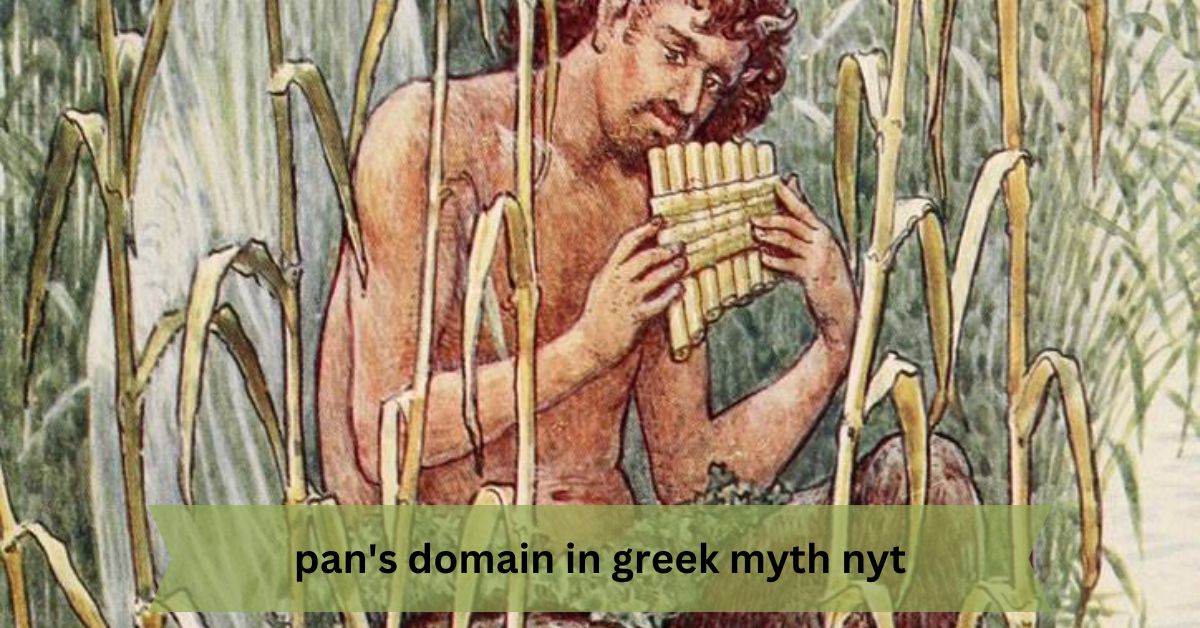Introduction to Pan in Greek Mythology
In Greek mythology, Pan’s Domain In Greek Myth Nyt is one of the most intriguing deities, often depicted as a half-goat, half-man figure. He embodies the untamed and wild aspects of nature, particularly associated with the rustic and pastoral landscapes of ancient Greece.
Pan is not only a god of the wild but also a symbol of human emotions, particularly those related to fear and ecstasy. Understanding pan’s domain in greek myth nytprovides insights into ancient Greek culture, nature, and spirituality.
What Is Pan’s Domain In Greek Myth Nyt?
The Nature of Pan’s Domain
Pan’s domain encompasses the wilderness, particularly forests, mountains, and pastures. His presence is felt in the rustling of leaves and the sounds of nature. This realm is not just a physical space but also represents the wild instincts and untamed emotions within humanity. Pan’s domain is a place where the civilized world meets the primal forces of nature, making it a vital part of Greek mythology.
The Significance of Nature in Greek Myth
In Greek mythology, nature plays a crucial role in the lives of both gods and mortals. Pan’s domain illustrates this connection, highlighting how the Greeks perceived nature as a powerful force that could evoke both beauty and fear.
The stories surrounding Pan often revolve around his interactions with humans and other deities, showcasing how nature influences their actions and emotions.
Pan’s Characteristics and Attributes
Physical Depiction
Pan is typically portrayed with the legs and horns of a goat, symbolizing his connection to the animal world. His appearance embodies the idea of duality—man and beast—representing the raw instincts of nature. This physicality contributes to his identity as the god of the wild, fertility, and rustic music.
Musical Talent
One of Pan’s most famous attributes is his musical ability, particularly with the pan flute (or syrinx). The flute, made from reeds, is a symbol of his connection to nature and the arts. Music in Pan’s domain serves not only as entertainment but also as a means of communication with nature and the gods.
Personality Traits
Pan is often depicted as playful, mischievous, and sometimes even malevolent. His laughter can evoke joy, but he can also instill panic—a phenomenon that has led to the term “panic” in modern language. This duality makes Pan a complex character in Greek mythology, representing the balance between joy and fear in nature.
Pan’s Domain In Greek Myth Nyt
Interactions with Other Deities
Pan frequently interacts with other gods and goddesses in Greek mythology. His relationships often highlight his nature as a mediator between the mortal world and the divine.
Pan and Hermes
One notable interaction is with Hermes, the messenger god. According to myths, Pan was born from Hermes and a nymph. This relationship emphasizes the connection between commerce, communication, and the wild. Together, they embody the balance between civilization and nature.
Pan and Dionysus
Pan’s connection with Dionysus, the god of wine and festivity, further illustrates his role in Greek mythology. Both deities celebrate the primal aspects of existence, encouraging humans to embrace their wild sides. Their stories often depict revelry and the joys of nature.
Pan’s Encounters with Mortals
Many myths recount Pan’s encounters with mortals, showcasing his influence over human emotions. His ability to instill panic and joy reflects the unpredictable nature of the wilderness.
The Nymphs
Pan is known for his love for nymphs, the beautiful spirits of nature. His pursuits often lead to comical yet poignant stories, such as his unrequited love for Syrinx, who transformed into reeds to escape him. This myth explains the origin of the pan flute, representing the interplay of love, nature, and art.
The Story of the Shepherds
Pan is also depicted as a protector of shepherds and their flocks. His domain provides solace to those who work closely with nature, emphasizing the importance of harmony between humans and the natural world. These stories reinforce the idea that Pan is a guardian of the wilderness and its inhabitants.
The Symbolism of Pan’s Domain
Nature as a Reflection of Human Emotion
Pan’s domain symbolizes the complexities of human emotion, especially fear and joy. The wildness of nature reflects the untamed aspects of the human spirit. Myths surrounding Pan often emphasize how these emotions can lead to both ecstasy and terror.
The Balance of Civilization and Nature
Pan’s existence highlights the delicate balance between civilization and the wild. In ancient Greek culture, this balance was crucial for survival and harmony. Understanding Pan’s domain allows us to appreciate the importance of respecting nature and acknowledging its power.
Pan’s Legacy in Modern Culture
Influence on Literature and Art
Pan’s legacy extends beyond ancient Greece into modern literature and art. His character has inspired countless works, symbolizing the allure of the wild and the human condition. Writers and artists often draw on his dual nature to explore themes of love, fear, and the beauty of nature.
The Concept of “Panic”
The term “panic” derives from Pan’s ability to instill fear in those who wander into his domain. This concept continues to resonate in modern psychology, reflecting the ongoing influence of mythology on contemporary life.
Pan in Popular Media
In contemporary culture, Pan appears in various forms, from literature to films. His character often embodies themes of nature, music, and the duality of human emotions, reminding us of the timeless relevance of mythological figures.
FAQs Pan’s Domain in Greek Myth
1. What does Pan represent in Greek mythology?
Pan represents the wild aspects of nature, human emotions, and the connection between the two. He embodies joy and fear, showcasing the duality of existence.
2. How did Pan influence ancient Greek culture?
Pan influenced ancient Greek culture by emphasizing the importance of nature, music, and the balance between civilization and the wild. His stories reflect the Greeks’ reverence for the natural world.
3. What is the significance of Pan’s flute?
Pan’s flute symbolizes his connection to nature and music. It represents the beauty and complexity of the natural world, serving as a means of communication with both nature and the divine.
4. Why is Pan associated with panic?
Pan is associated with panic due to his ability to instill fear in those who wander into his domain. This connection has led to the modern use of the term “panic.”
5. How does Pan’s legacy continue in modern culture?
Pan’s legacy continues in modern culture through literature, art, and psychology. His character embodies themes of nature and human emotion, reminding us of the timeless relevance of mythology.
Conclusion
Pan’s domain in Greek myth offers a rich tapestry of themes and narratives that continue to resonate today. By exploring Pan’s character, his relationships, and the symbolism of his domain, we gain valuable insights into ancient Greek culture and the enduring power of nature.



